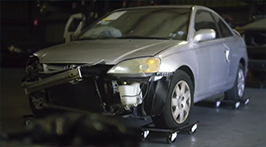Takata Airbag Replacement Part Study Released
“The findings in this analysis conducted for The Safety Institute are disturbing, said Richard Newsome of Newsome Melton law firm and Editor of ConsumerWatch.com. “For months now, all we have been hearing is how it’s the consumers responsibility to not drive cars that have been recalled, yet here we see evidence that car owners couldn’t get their recalled vehicles fixed even if they wanted to because the manufacturers don’t have the parts to fix them – and these were the vehicles that NHTSA deemed to be ‘highest risk.”
Today, The Safety Institute is releasing the results of a study into reported shortages of Takata airbag replacement parts. The study, which is sponsored by Newsome Melton, tracks complaints filed by consumers who were turned away for repairs for their Takata airbags because the dealership did not have sufficient replacement parts.
Last November, the National Highway Traffic Safety Administration (“NHTSA”) took the unprecedented step of dividing recalled vehicles with Takata airbags into various groups with different “priority” levels. This process was put in place in place because the unprecedented scope of the Takata recall has turned airbag replacement parts into scarce commodities. The priority levels were set according to vehicle age and exposure to humidity—the factors NHTSA believes are indicative of inflator rupture risk. Priority Group 1 includes model year 2008 and older vehicles which were registered in Alabama, California, Florida, Georgia, Hawaii, Louisiana, Mississippi, South Carolina, Texas, American Samoa, Guam, the Northern Mariana Islands, Puerto Rico, and the Virgin Islands.
The NHTSA Order required that manufactures make replacement parts available for all Priority Group 1 vehicles by March 30 of this year. The study tracked consumer complaints made to NHTSA from April through July, and found many reports of consumers with Priority Group 1 vehicles being turned away for airbag replacements. And the study’s authors believe those complaints represent only a “small fraction” of the consumers who have actually been turned away, as not everyone will go through the process of lodging a complaint through NHTSA.
While one might expect harsh sanctions for failing to meet a federal safety requirement, the study reports that NHTSA has yet to announce any penalties at all for the violation of the Order. The authors were also unable to locate any evidence that NHTSA was even investigating the potential violations, although BMW did apparently ask for and receive an extension to meet the requirements.
The study comes within weeks of the September 30 deadline for manufacturers to make replacement parts available for all Priority Group 2 vehicles, which will include vehicles throughout the country.
The study can be viewed at this link.
Approximately 33,000 tire-related crashes occur each and every year, resulting in about...
The Ford C-Max Energi Electric car is being blamed for starting more...
“The findings in this analysis conducted for The Safety Institute are disturbing,...

